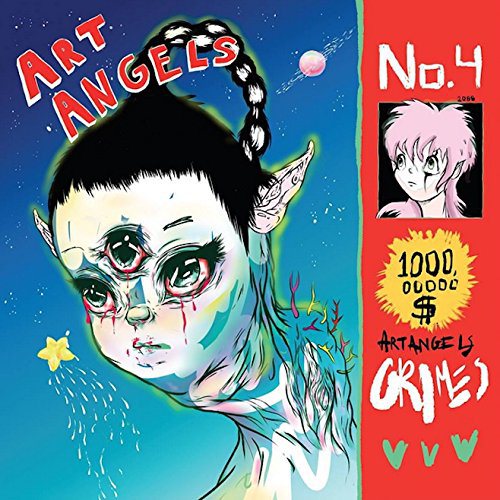We are witnessing a transition. The dissonant, synthetic strings and trilling soprano that lace opening track ‘Laughing And Not Being Normal’ feel like a remnant, a dark brooding outro to the 2012 Grimes colossus Visions that has spilled over into the present to remind us what came before and then to draw a line under it. As it builds to a grinding crescendo it just as quickly zips into silence. Darkness done. From here things sonically brighten to warm glinting sun, flashes of the shiniest pop and gaudy, blinding neon noise. Where Visions looked inward – sounding like the echo of your voice inside your skull – Art Angels blasts relentlessly outward; an unabashed pleasure seeking missile that blurs the lines between euphoria and the nauseating sickness of excess.
On ‘California’ Boucher is a zombie Joni Mitchell, swapping romantic homesickness for apocalyptic fatalism and lamenting an industry that prefers a version of her they can easily define (a state likely to drag on until the ice caps melt and she drowns). ‘Belly Of The Beat’ is a playground mantra with ice cream vocals and bright guitar riffs that sweetly wraps itself in the pleasures and healing properties of making music. ‘Easily’ exists in a louche mid-place of piano chords and girl gang swagger. ‘Butterfly’ unfurls from a tropical beat before cresting the album to a close on a wave of smooth, glimmering electro disco – the chorus lyric warning of something huge and foreboding that’s simultaneously "sweeter than a sugar cane."
Despite purposefully isolating herself from current music for a full year during the making of her fourth album, Claire Boucher has inadvertently created something that calls to mind a plethora of very audible references: Taylor Swift, Lady Gaga, Orbit-era Madonna, ‘Love At First Sight’-era Kylie, Tori Amos, All Saints, MIA, Bis, No Doubt – perhaps partly because the mashing of those edgy, indie and more 90s elements is a staunch characteristic of contemporary mainstream pop. But it speaks to her unabashed fandom of the genre too, and I for one have no issues with that familiarity. It’s the perfect conduit for a more extroverted Grimes, plus in the same way that the ‘Oblivion’ – a track about Boucher’s experience of assault – melodically aped Tiffany’s 1987 hit ‘I Think We’re Alone Now’, there is always more going on than meets the eye.
For all the eloquence of its pop tendency, the album’s growl is more pronounced (breaking through completely on the raging ‘Kill V. Maim’), its intentions grubbier and the scope of her creative inspiration less binary, creating a wider spectrum for the ‘other’ of her lyrics. With Boucher, ‘You’ is less likely to stand in for a universal male referent and more for another woman, an animal, an insect, a planet. Its also mind-addling to remember that the intensely layered performance, musicianship and production present here – where melodic veneer peels back to glimpse something vastly more complex – is an entirely solo endeavour, give or take guest spots from Janelle Monáe and Taiwanese rapper Aristophanes. Boucher is a fearsome creative force who has demystified the male dominated world of pop production – usually a clusterfuck of ‘more the merrier’ collaborations – into a solo project that both matches and eclipses commercial shimmer. She proves powerfully that one physical body is more than enough.
This is enticing too, as Boucher’s own identity is so fluid, apparently revelling in a certain distance from the work she creates. On Art Angels, she speaks via a plethora of identities and from an array of celestial bodies – the angel, the beast, the alien, all atomising in the use of her voice. The familiar, lambent lisp of her vocal is exchanged here for bold melodic runs, soulful unctuous tonalities, brazen snarl and a brattish, cartoon squeal. She’s giving way to a showier ability that could be considered anathema in alternative music. The best way to exit your body is via your voice and Boucher is fully aware of the escapist possibilities of that aural trick.
All this culminates in a fever dream of perfect, unsettling pop for a crumbling world. Jaw-breaking, brain-rattling and polymorphously perverse. Listen again and again for intense pleasure. Keep listening until you pass out sick.


